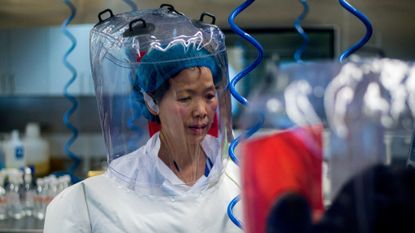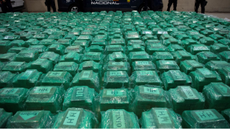Did the Covid virus leak from a lab?
Once dismissed as a conspiracy theory, the idea that Covid-19 originated in a virology lab in Wuhan now has many adherents

There have been more than seven million confirmed Covid-19-linked deaths since the virus first emerged in late 2019. But the origin of the virus that caused them, Sars-CoV-2, is still shrouded in uncertainty, and debate on the issue has become toxic and highly politicised.
There are two main theories: that it emerged naturally via "zoonotic transfer" in a market where wild animals were sold in Wuhan, eastern China; and that it escaped from a laboratory in the same city – which would make it the world's most lethal industrial accident.
What exactly does zoonotic transfer involve?
When pathogens jump from a wild animal to a human population not previously exposed to them, it is called "zoonotic spillover"; it is the predominant cause of recent pandemics. When Covid-19 emerged, many of the first cases were linked to the Huanan "wet market" in Wuhan, where live wild animals were sold for meat. It was widely assumed at the time that the pandemic had started there; the Sars epidemic in 2003 had been traced to wet markets in southern China. Virologists believe that the previously unknown virus responsible, Sars-CoV-2, originated in bats, probably in southern China, and most think it found an intermediate host in the form of one of the animals at the market.
Subscribe to The Week
Escape your echo chamber. Get the facts behind the news, plus analysis from multiple perspectives.

Sign up for The Week's Free Newsletters
From our morning news briefing to a weekly Good News Newsletter, get the best of The Week delivered directly to your inbox.
From our morning news briefing to a weekly Good News Newsletter, get the best of The Week delivered directly to your inbox.
Why is the lab-leak theory appealing?
Can it really be a coincidence, its proponents ask, that a coronavirus pandemic started within a few miles of the Wuhan Institute of Virology (WIV), the world's biggest research laboratory for bat coronaviruses? The mostly closely related viruses to Sars-CoV-2 in the wild are found 1,000 miles away in Yunnan, southern China. The WIV's scientists regularly travelled there to collect bat coronaviruses, and carry out research into how they infect humans.
The WIV's Dr Shi Zhengli, known as the "bat woman" for her expertise in the area, initially expressed surprise that an outbreak should have begun in Wuhan, and wondered if it had come from her lab. The Wuhan lab had worked on the closest known relative of Sars-CoV-2, RaTG13 (which is 96.2% genetically similar), and had done this type of work under Biosafety Level 2, out of a possible four levels of precautions – arguably too low for such dangerous pathogens. There's other circumstantial evidence, too, supporting the theory.
What other evidence is there?
In the case of Sars and the Mers pandemic, animal hosts infected with viruses were found. In the case of Covid-19, no animals infected with Sars-CoV-2 were found in the market; in fact, none were found anywhere, though you might expect them to leave traces in the supply chain. In addition, we know that the laboratory pursued risky "gain of function" experiments that resulted in viruses becoming more infectious.
A leaked funding proposal from 2018 described plans to create viruses at the WIV strikingly similar to Sars-CoV-2, modified so that they have a "furin cleavage site", a feature on the virus's spike protein that can make them more infectious. And less than two years later, "a never-before-seen Sars-like virus with a newly introduced furin cleavage site" emerged in Wuhan, writes Dr Alina Chan, a leading supporter of the lab-leak theory. One other alarming detail is that three scientists on Dr Shi's team were reported to have fallen ill with Covid-like symptoms in November 2019.
Doesn’t this sound suspicious?
Yes, but even Chan would admit that there is no definitive proof. And most in the field think that the natural-origin theory is simply much more plausible. A pair of papers published in Science in 2022 by Prof Michael Worobey et al set out the case: 32% of the first 174 human cases had a clear link to the Huanan market, in a city of 12 million people; while cases not directly linked to the market were clustered close to it. The earliest cases were found in the market's southwest, where vendors of live wild animals, such as raccoon dogs and bamboo rats, congregated.
Samples were taken in January 2020; many of the stalls tested positive for Sars-CoV-2, and showed DNA traces of the animals nearby. Lab-leak theorists hypothesise that a human infected by the lab went there and caused a "super-spreader event" – a coincidence made even more improbable by the fact two separate strains of Sars-CoV-2 were found in the market. Research shows that, in areas where infected animals are kept close to humans, such multiple zoonotic jumps are common; by contrast, the chances of two humans infected with separate strains of Covid going to the market are very remote.
What about the other circumstantial evidence?
None of it is very convincing. There is no evidence that the Wuhan lab held a Sars-CoV-2 precursor; RaTG13, which it worked on, is too far away in evolutionary terms to have been a progenitor. Nor is there any evidence that Sars-CoV-2 was modified in a lab. And there's a simple explanation for why no infected animals were found at the market: they were taken away and destroyed for public health reasons. As for the lab's staff falling ill with Covid-like symptoms – such illnesses aren't at all unusual in the flu season.
How can we be sure of all this?
We can't be entirely sure, not least because of the secretive attitude of the Chinese authorities. But expert opinion is fairly clear. Early this year, 168 epidemiologists and virologists were polled by the Global Catastrophic Risk Institute, and four out of five stated that a natural zoonotic origin was more than 50% likely. Another genetic study of samples from Huanan market published last month proved "beyond reasonable doubt", said its authors, that the pandemic began there, and that other theories required "fanciful" interpretations of the evidence.
Sign up for Today's Best Articles in your inbox
A free daily email with the biggest news stories of the day – and the best features from TheWeek.com
-
 Thirteen missing after Red Sea tourist boat sinks
Thirteen missing after Red Sea tourist boat sinksSpeed Read The vessel sank near the Egyptian coastal town of Marsa Alam
By Arion McNicoll, The Week UK Published
-
 Khan supporters converge on Islamabad
Khan supporters converge on IslamabadSpeed Read Protesters clashing with Pakistani authorities are demanding the release of jailed former prime minister Imran Khan
By Rafi Schwartz, The Week US Published
-
 Prosecutor drops federal cases against Trump
Prosecutor drops federal cases against TrumpSpeed Read Special counsel Jack Smith requested to drop the charges against President-elect Donald Trump for his efforts to overturn the 2020 election
By Rafi Schwartz, The Week US Published
-
 The Spanish cop, 20 million euros and 13 tonnes of cocaine
The Spanish cop, 20 million euros and 13 tonnes of cocaineIn the Spotlight Óscar Sánchez Gil, Chief Inspector of Spain's Economic and Tax Crimes Unit, has been arrested for drug trafficking
By The Week UK Published
-
 Funeral in Berlin: Scholz pulls the plug on his coalition
Funeral in Berlin: Scholz pulls the plug on his coalitionTalking Point In the midst of Germany's economic crisis, the 'traffic-light' coalition comes to a 'ignoble end'
By The Week UK Published
-
 The teenage 'maths prodigy' who turned out to be a cheat
The teenage 'maths prodigy' who turned out to be a cheatUnder The Radar Jiang Ping defied expectations in a global competition but something wasn't right
By Chas Newkey-Burden, The Week UK Published
-
 Why China's young people are rejecting marriage
Why China's young people are rejecting marriageThe Explainer Changing attitudes and a slowing economy are contributing to a slump in weddings
By Chas Newkey-Burden, The Week UK Published
-
 Israel attacks Iran: a 'limited' retaliation
Israel attacks Iran: a 'limited' retaliationTalking Point Iran's humiliated leaders must decide how to respond to Netanyahu's measured strike
By The Week UK Published
-
 Cuba's energy crisis
Cuba's energy crisisThe Explainer Already beset by a host of issues, the island nation is struggling with nationwide blackouts
By Rebekah Evans, The Week UK Published
-
 Exodus: the desperate rush to get out of Lebanon
Exodus: the desperate rush to get out of LebanonTalking Point As the Israel-Hezbollah conflict escalates Lebanon faces an 'unprecedented' refugee crisis
By The Week UK Published
-
 A storm of lies: the politics of hurricane season
A storm of lies: the politics of hurricane seasonTalking Point Trump and allies weaponise hurricane season, falsely accusing Biden-Harris administration of misusing relief funds
By The Week UK Published